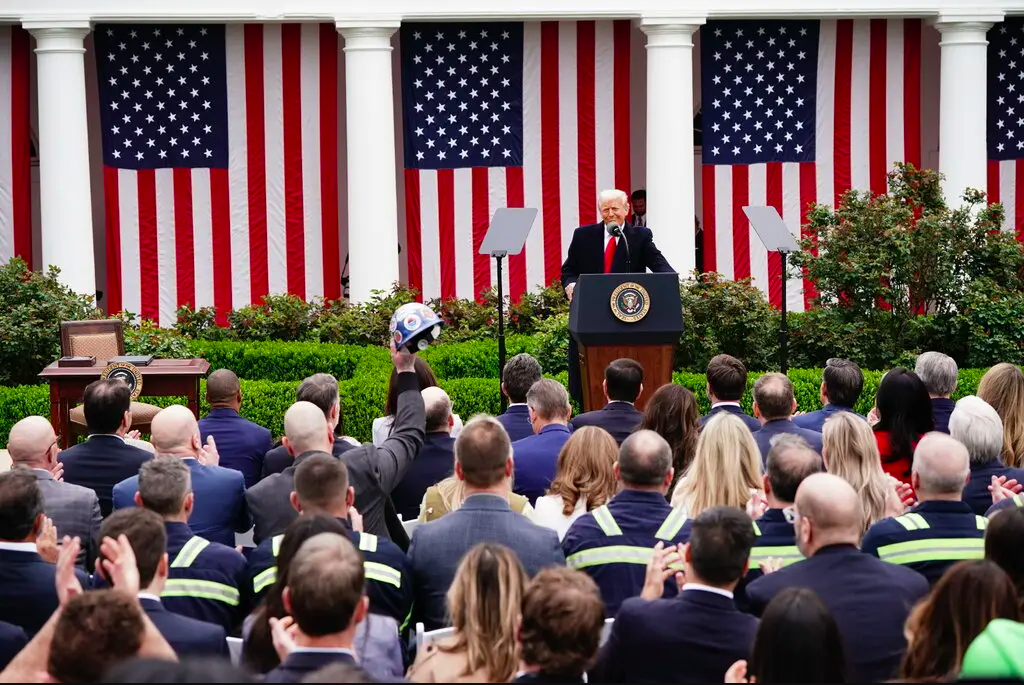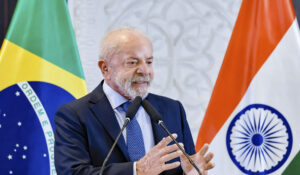
Published 03/04/2025 09:57 | Edited 03/04/2025 10:51
United States President Donald Trump has launched a wide and foolhardy reform of US commercial policy, imposing tariffs on imports from Brazil, China, European Union and virtually all nations, under the unfounded allegation of “reciprocity”. The measure, called “Liberation Day” by the White House, aims to reduce a commercial deficit of $ 1.2 trillion, mirroring the tariffs that other countries apply to US products. However, the global impact of this decision may be devastating, with serious implications for the world economy and the United States themselves.
Brazilian products, for example, will face a rate of 10% – equivalent to the tax applied by Brazil on US imports – while exports from China will be taxed by 34%. Policy also includes heavy cars: 25% on imported cars from April 3 and 25% on auto parts from May 3, compared to the current rate of 2.5%.
Trump’s protectionism is based on the false premise that the US is being explored by its business partners. History shows that measures like these tend to have the opposite effects to those desired. High tariffs make products more, reduce consumption and discourage investment, causing economic discouragement. The risk of a new world recession becomes palpable.
Trump has classified the decision as a “historical” correction of decades of “unfair” business practices, accusing nations of “stealing” the US through currency manipulation, non -monetary subsidies and barriers. “This is how we will do prosperous America again,” he said, promising to relive the “American dream” through industrial rule.
Global reactions and increasing tensions
The announcement has already caused alarm among US allies. Members of the European Union, such as France and Italy, study retaliatory measures, while the Brazilian Senate quickly approved legislation to counterattack the tariffs. The United Kingdom, despite having a 10%reciprocal rate, expressed concern about the precedent destabilizing. Canada and Mexico-excluded from the initial list-maintain caution, given their integration with US supply chains.
In Brazil, sectors such as steel and aluminum will be impacted, reducing exports and threatening jobs. The tariff imposed on Brazil can reach 10%, while China (34%), European Union (20%) and Japan (24%) will also be strongly reached.
Commercial barriers often generate retaliation. It will not be surprised if affected countries respond with their own rates against US products, resulting in a trade war that can curb global growth and precipitate a major economic crisis.
Studies cited by analysts estimate that the policy can drain more than $ 1 trillion from the world economy, reaching emerging export -dependent markets. For the US, risks include inflationary pressures and possible recession, undermining Trump’s promises to increase purchasing power and jobs in the industry.
The Bolimeranga Effect in the USA
Trump’s strategy can reach his own economy. Increased rates will raise input costs to US industries, reducing their competitiveness. The American consumer will also feel the weight of new pocket rates, with higher prices in various products.
Inflation, which already worries analysts, should accelerate. Estimates point out that the rate can jump from the current 3% to 6%, leading to a drop in consumption and the risk of recession. In addition, there is a possibility that the strategy will lead the Federal Reserve (Fed) to reduce interest rates in an attempt to alleviate negative impacts on the US economy.
USA isolated and the end of globalization?
The imposition of tariffs marks a historical setback on American trade policy. Since World War II, the world has moved to a progressive reduction of commercial barriers and the integration of markets. Trump, by opting for isolationism, reverses this trend and may precipitate a new global scenario, in which the US lose economic protagonism.
By hindering free trade, Trump also encourages his partners to look for alternatives outside the United States. Countries such as China and the European Union can strengthen their business relationships, reducing their dependence on the US market and compromising the future of the US economy.
Trump’s policy is based on an unfeasible view of zero commerce sum, prioritizing short-term political gains on long-term economic stability. By framing rates as a tool to “regain prosperity”, its administration risks alienating allies and destabilizing markets. The dollar itself may lose strength if countries seek alternatives to their business transactions.
In addition, the focus on bilateral reciprocity ignores the complexity of value global chains. Automobile manufacturers, for example, warn that the 25% tariff over cars can harm industries dependent on imported components, making products for consumers more expensive.
A risky game
Trump’s “Liberation Day” marks a radical change in US commercial strategy, prioritizing confrontation rather than cooperation. The measure threatens to fragment alliances, disturb global trade and generate effects contrary to the economy. For Brazil and other affected countries, the way ahead remains uncertain – a reminder of the dangers of economic nationalism in an interconnected world.
For trumpists, reciprocal tariff policy can sound like a triumph. For the rest of the world, and for the US, it may be the beginning of an economic disaster of incalculable proportions.
Source: vermelho.org.br

